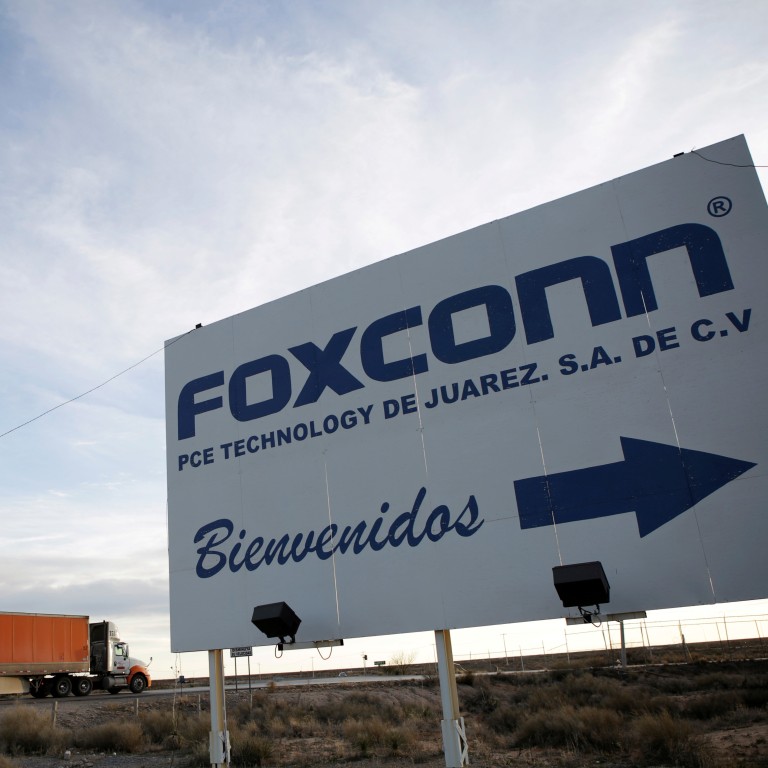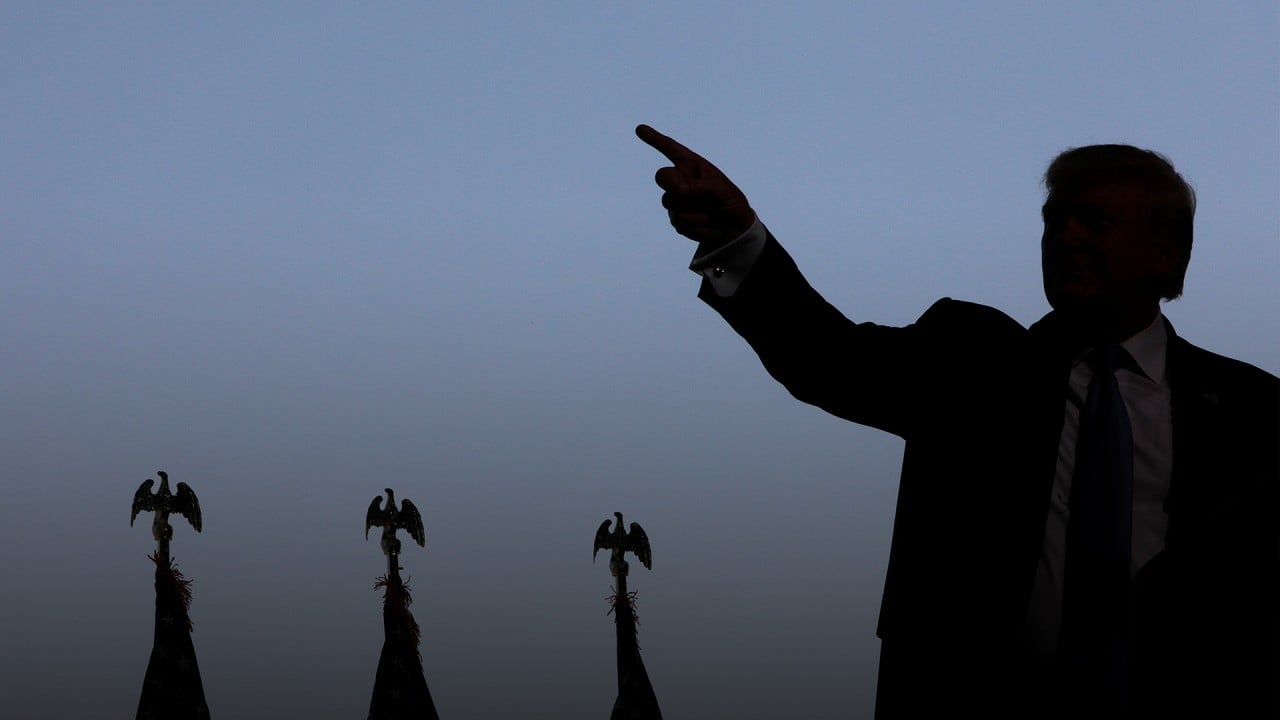
Foxconn, Pegatron among Asian firms considering Mexico factories as China risks grow
- Taiwan-based electronics manufacturers Foxconn and Pegatron are among companies said to be eyeing new factories in Mexico
- The plans could usher in billions of dollars in badly needed fresh investments over the next few years for Latin America’s second-largest economy
The plans could usher in billions of dollars in badly needed fresh investments over the next few years for Latin America’s second-largest economy, which is primed for its worst recession since the 1930s Great Depression.
According to two of the sources, Foxconn has plans to use the factory to make Apple iPhones. However, one of the sources said, there had been no sign of Apple’s direct involvement in the plan yet.
Foxconn is likely to make a final decision on a new factory later this year, and work will commence after that, the two people said, adding there was no certainty the company would stick to the plan.
Apple’s climate promise depends on partners TSMC, Foxconn going green
Apple spokesman Josh Rosenstock declined to comment.
Pegatron is also in early discussions with lenders about an additional facility in Mexico mainly to assemble chips and other electronic components, said the people, who declined to be identified as the talks are confidential. Pegatron declined to comment.
Foxconn has five factories in Mexico mainly making televisions and servers. Its possible expansion would underscore a broader and gradual shift of global supply chains away from China amid a Sino-US trade war and the coronavirus crisis.

02:12
The story of Terry Gou and Foxconn
The plans come as the idea of “near-shoring” gains ground in Washington. The Trump administration is exploring financial incentives to encourage firms to move production facilities from Asia to the United States, Latin America and the Caribbean.
Brandishing a new deal locking in free trade with the world’s biggest consumer market, Mexico also has geography, low wages and time zones in its favour. Despite the global recession and concerns about the business climate under President Andres Manuel Lopez Obrador, government data shows foreign investment largely holding up so far this year.
Mexico eyes investment from Asia after new North American trade deal
“The company indeed has contacted the (Mexican) government,” a third source said about Foxconn, adding the talks were at an early stage and rising cases of coronavirus in Mexico were a major concern for the possible investment.
Reuters in July reported Foxconn planned to invest up to US$1 billion to expand a factory in India where it assembles Apple iPhones.
Foxconn Chairman Liu Young-way told an investor conference in Taipei on August 12 the world was split into “G2” – or two groups – following Sino-US tensions, saying his firm was working on “providing two sets of supply chain to service the two markets.”
“The world factory no longer exists,” he said, adding that about 30 per cent of the company’s products were now made outside China and the ratio could increase.
How AI and human rights became embroiled in US-China tech war
Foxconn unit Sharp has said it is stepping up television production in Mexico. Sharp last year said it would set up a plant in Vietnam to shift part of its China production. It said it had no further information to give.
It was not immediately clear which product lines were being considered by Luxshare, which according to media reports is a leading manufacturer of Apple Airpods. Luxshare did not respond to a request for comment.

03:21
US-China tech war: Tumultuous times for Huawei - can it survive?
The Taipei Economic and Cultural Office in Mexico, which represents Taiwan’s government in the country, said it had heard Foxconn was interested in building another factory in Ciudad Juarez, in the northern border state of Chihuahua.
“Pegatron, I also understand, wants to move a production line from China to Mexico,” the office’s Director General Armando Cheng told Reuters. He said he did not know details of either company’s plans.
“Mexico is one of the ideal countries for companies considering readjusting their chain of suppliers,” Cheng said.
How far can reshoring and decoupling go given interconnected supply chains?
The scale of investment by Asian electronics contract manufacturers, and the employment they would create in Mexico, are not yet clear.
Promised investment in new manufacturing capacity has not always materialised.
Those plans have shifted dramatically. In 2019 the company downgraded the size of the planned factory. In April, Foxconn said it would make ventilators at the plant in partnership with Medtronic.
Coronavirus has ground cross-Pacific supply chains to a standstill, stranding automobile, electronics and pharmaceutical components from China, exacerbating firms’ concerns about having their productive base an ocean away from American consumers.
Apple supplier Foxconn, others said to be hit by India’s scrutiny of imports from China
Mexico has spoken to a host of foreign companies in an effort to lure business from Asia to capitalise on the trade deal and was preparing to speak to Apple about relocating manufacturing, Economy Minister Graciela Marquez told Reuters in July.
She said she had not spoken to Foxconn, Pegatron and Luxshare directly. A senior government official said those companies were among others interested in investing in Mexico.

01:22
US-China trade talks postponed as Trump says he does not want to talk to China
The government did not respond to a request for further comment prior to publication.
Despite the potential and solid investment figures, many investors see Lopez Obrador squandering a historic opportunity.
“It could have been a tidal wave,” said Eduardo Ramos-Gomez, a partner at Duane Morris & Selvam, a law firm working with Taiwanese and Chinese companies looking at Mexico.
In major win for Trump, Senate passes US-Canada-Mexico trade deal
Critics cite Mexico’s poor handling of the pandemic – it is third in global deaths – along with Lopez Obrador’s meddling in private investment decisions such as the cancellation of a US$1-billion brewery by US firm Constellation Brands, the scrapping of a major airport project and pressure on energy companies.
The government has denied such decisions were anti-business.
Regardless, Mexico’s appeal is attracting some.
Samuel Campos, an executive managing director of real estate brokerage Newmark Knight Frank, said his company is currently helping two Chinese companies, one in the autos sector and the other in manufacturing, relocate to an industrial cluster in Mexico.
Campos said electronics, medical and automotive firms in Asia are likely to help drive investments into Mexico in the fourth quarter this year. For Alan Russell, chief executive and chairman of Tecma Group, a company managing factories in Mexico, manufacturers in China that want to keep market share in North America have few choices.
“They’re going to have shorten their supply chain and be more regional,” he said. “It seems the virus has tipped the scale.”

